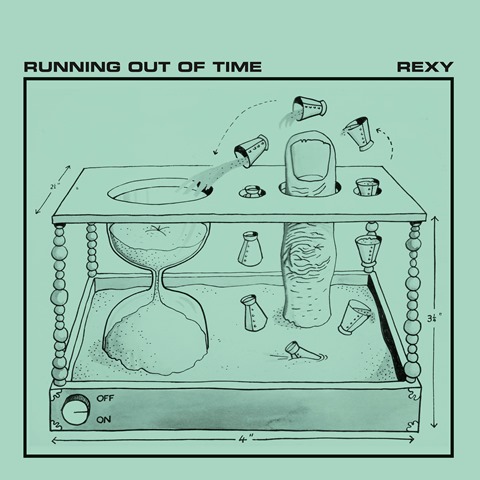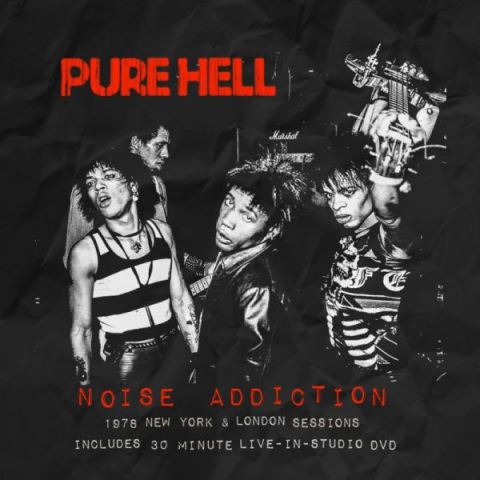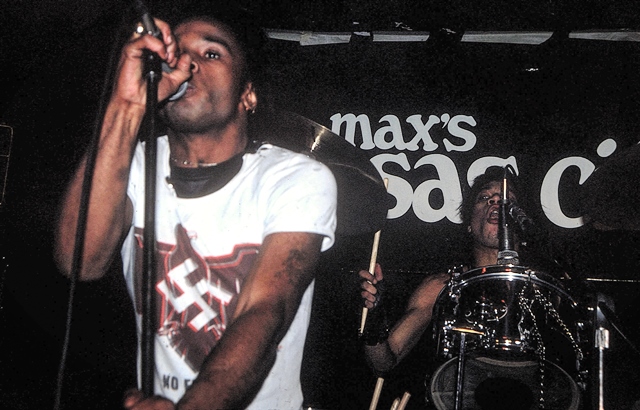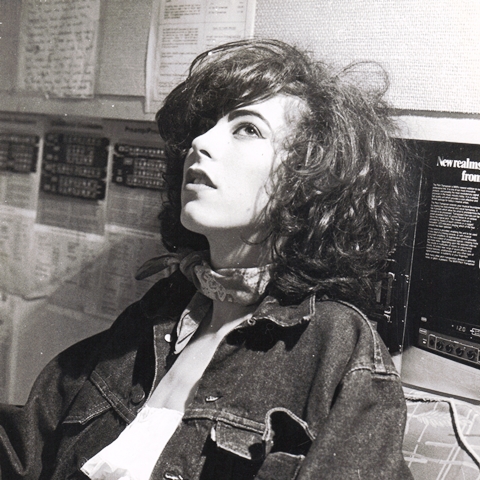Reissue CDs Weekly: Pure Hell, Rexy | reviews, news & interviews
Reissue CDs Weekly: Pure Hell, Rexy
Reissue CDs Weekly: Pure Hell, Rexy
New York punks and oddball Brits resurrected to slake the collector-driven thirst for obscurities

The variables which help records attain cult status are usually permutations of obscurity, patronage, rarity and perceived or received notions of greatness. This fluid formula can make an album the acme of grooviness, even if barely anyone cared or had even heard of it when it was originally issued. Witness the Lewis album, L’Amour.
This sanctioning process will never cease. There will always be something ripe for resurrection. The price of original pressings is a fair guide to interest and therefore a possible indicator of new audiences for records which had fallen between the cracks. Of course, in the online world of auctions, what a record sells for might just be a consequence of competitive bidding by a few well-heeled collectors rather than evidence for wholesale demand. Nonetheless, the price of a rarity is worth bearing in mind before taking the plunge and releasing a reissue. As is genre. For example, punk is a perennial.
 Take Pure Hell and Rexy, both of whom are the subject of new reissues. Pure Hell were a New York punk band who issued just one single, and on a British label too. Their brutish 1978 demolition of Nancy Sinatra’s “These Boots Are Made for Walking” fetches anywhere between £25 and £50 in its original form. The sole album by Britain’s Rexy, 1981’s Running out of Time, now commands close to £200. Five years ago, the going rate was £25. Their stock is, literally, rising.
Take Pure Hell and Rexy, both of whom are the subject of new reissues. Pure Hell were a New York punk band who issued just one single, and on a British label too. Their brutish 1978 demolition of Nancy Sinatra’s “These Boots Are Made for Walking” fetches anywhere between £25 and £50 in its original form. The sole album by Britain’s Rexy, 1981’s Running out of Time, now commands close to £200. Five years ago, the going rate was £25. Their stock is, literally, rising.
Reissues bring the opportunity to sit down repeatedly with one of these coveted items, soak it up via proper speakers and to assess whether it actually is worth hearing without forking out a ton of cash for an original pressing. Things which no dodgy download or online listen can accomplish. For Pure Hell though, the music is part of the picture: they were black, a punk band and managed by Curtis Knight, whose own band featured Jimi Hendrix for a fleeting period. Thus, they inevitably attracted attention. Noise Addiction collects their shelved album on one disc and teams it with a DVD of a cable TV performance. Both discs were initially issued as a single package in 2006 and the new, repackaged Noise Addiction is a reissue. Rexy are less-easily tagged, and Running out of Time has never been reissued before.
 Pure Hell formed in Philadelphia in 1974 as Pretty Poison. If singer Kenny Gordon is to be believed in the hubristic interview quoted in Noise Addiction's liner notes, their Hendrix influence was supplemented by a yen for The MC5 and Stooges. Gordon was seemingly adept at sniffing out seminal influences on punk before most folks and says he first encountered The New York Dolls’ Johnny Thunders on a visit to New York in 1974. His band soon moved to the city, donned Dolls-style high heels (wigs, too) and used the Dolls’ rehearsal space. Curtis Knight became their manager in 1977, by when they were called Pure Hell and had embraced a punk look.
Pure Hell formed in Philadelphia in 1974 as Pretty Poison. If singer Kenny Gordon is to be believed in the hubristic interview quoted in Noise Addiction's liner notes, their Hendrix influence was supplemented by a yen for The MC5 and Stooges. Gordon was seemingly adept at sniffing out seminal influences on punk before most folks and says he first encountered The New York Dolls’ Johnny Thunders on a visit to New York in 1974. His band soon moved to the city, donned Dolls-style high heels (wigs, too) and used the Dolls’ rehearsal space. Curtis Knight became their manager in 1977, by when they were called Pure Hell and had embraced a punk look.
At this point – and it is the most interesting thing about them – Pure Hell were an anomaly on the New York scene. The best of the bands which had emerged by 1976 (The Patti Smith Group, The Ramones, Talking Heads, Television, etc.) were attracting national and international attention, had set their own styles and were different from each other. As they all headed out of town, there was a vacuum to fill. Pure Hell gave it shot but were followers, as amply shown by Gordon’s silly, out-to-shock swastika T-shirt (pictured below right). The new New York sound emerging as Pure Hell adopted punk and played on a Sid Vicious bill was arty and angular: the no wave and art rock which eventually spawned Sonic Youth. New York did not have punk bands as such, apart from the opportunistic Pure Hell.
 As for their music, Noise Addiction reveals Pure Hell as sonically closer to the emergent West Coast hardcore of Fear than anything from the opposite coast with the possible exception of Boston’s La Peste. Guitarist Preston Morris peppered their barked-out songs with Hendrix-style flurries and was wont to play his instrument behind his head. The live DVD, with its dubbed-on applause, shows Gordon – trained as an acrobat – doing hand-stands and fancying himself as a punk Mick Jagger.
As for their music, Noise Addiction reveals Pure Hell as sonically closer to the emergent West Coast hardcore of Fear than anything from the opposite coast with the possible exception of Boston’s La Peste. Guitarist Preston Morris peppered their barked-out songs with Hendrix-style flurries and was wont to play his instrument behind his head. The live DVD, with its dubbed-on applause, shows Gordon – trained as an acrobat – doing hand-stands and fancying himself as a punk Mick Jagger.
Pure Hell had declared themselves “the world’s first black punk band” but when they arrived in the UK in November 1978, where they supported the UK Subs, they claimed they were now a “black raunchy heavy metal rock ‘n’ roll band”. Whatever they were, and despite their ability as players, Pure Hell made a horrible racket, were sledgehammer subtle and chancers par excellence. Noise Addiction is almost impossible to listen to and makes the UK Subs sound like The Moody Blues. Punk collectors will still want the pricey single as it remains an artefact, but it’s unlikely anyone else could bear ploughing through these two discs
Rexy did not desperately shoehorn themselves into a genre, and have recently been fortunate to have the title track of their album covered by Connan Mockasin. They also enjoy the support of Samantha Urbani, the former vocalist of hip Brooklyn band Friends. She is involved in the reissue of Running out of Time.
 The face of the offbeat Rexy was that of art student and London club scenester Annabel Nayman (pictured left), who called herself Rex. A striking regular at Steve Strange’s Blitz, she was not initially a singer. The music was supplied by future Eurythmics keyboard player and Boy George sideman Vic Martin. United, Nayman and Martin did not create a New Romantic or typical synth-pop confection.
The face of the offbeat Rexy was that of art student and London club scenester Annabel Nayman (pictured left), who called herself Rex. A striking regular at Steve Strange’s Blitz, she was not initially a singer. The music was supplied by future Eurythmics keyboard player and Boy George sideman Vic Martin. United, Nayman and Martin did not create a New Romantic or typical synth-pop confection.
Imagine Comic Strip-era Jennifer Saunders intoning over backing tracks which could either be the theme for Grange Hill or soundtrack moody night scenes in an ITV cop drama of the period. Nayman’s talk-singing is an acquired taste, as are the album’s tilts towards jazz funk, humorous disquisitions on being in the police and straight, wine-sipping people. The knowingly absurdist organ version of “Johnny B Goode” is nuts. And the title track really is an atmospheric lost classic. Unfortunately, this no-frills reissue comes up short with no liner notes, and does not feature a non-album B-side, so it fails to adequately tell the story of the oddball Rexy.
Neither Pure Hell or Rexy were going to trouble the charts. But they have been on the minds of the collectors who have pushed up the price of their original records. Each was a curiosity and both are now experiencing a belated moment in the sun due to the efforts of those behind these reissues. For this, praise be.
- Next week: Kinked! - a ground-breaking collection of the songs Dave and Ray Davies gave away
Share this article
Add comment
more New music
 Album: Jonny Drop • Andrew Ashong - The Puzzle Dust
Bottled sunshine from a Brit soul-jazz team-up
Album: Jonny Drop • Andrew Ashong - The Puzzle Dust
Bottled sunshine from a Brit soul-jazz team-up
 theartsdesk on Vinyl: Record Store Day Special 2024
Annual edition checking out records exclusively available on this year's Record Store Day
theartsdesk on Vinyl: Record Store Day Special 2024
Annual edition checking out records exclusively available on this year's Record Store Day
 Album: Pearl Jam - Dark Matter
Enduring grunge icons return full of energy, arguably their most empowered yet
Album: Pearl Jam - Dark Matter
Enduring grunge icons return full of energy, arguably their most empowered yet
 Album: Paraorchestra with Brett Anderson and Charles Hazlewood - Death Songbook
An uneven voyage into darkness
Album: Paraorchestra with Brett Anderson and Charles Hazlewood - Death Songbook
An uneven voyage into darkness
 theartsdesk on Vinyl 83: Deep Purple, Annie Anxiety, Ghetts, WHAM!, Kaiser Chiefs, Butthole Surfers and more
The most wide-ranging regular record reviews in this galaxy
theartsdesk on Vinyl 83: Deep Purple, Annie Anxiety, Ghetts, WHAM!, Kaiser Chiefs, Butthole Surfers and more
The most wide-ranging regular record reviews in this galaxy
 Album: EMEL - MRA
Tunisian-American singer's latest is fired with feminism and global electro-pop maximalism
Album: EMEL - MRA
Tunisian-American singer's latest is fired with feminism and global electro-pop maximalism
 Music Reissues Weekly: Congo Funk! - Sound Madness from the Shores of the Mighty Congo River
Assiduous exploration of the interconnected musical ecosystems of Brazzaville and Kinshasa
Music Reissues Weekly: Congo Funk! - Sound Madness from the Shores of the Mighty Congo River
Assiduous exploration of the interconnected musical ecosystems of Brazzaville and Kinshasa
 Ellie Goulding, Royal Philharmonic Concert Orchestra, Royal Albert Hall review - a mellow evening of strings and song
Replacing dance beats with orchestral sounds gives the music a whole new feel
Ellie Goulding, Royal Philharmonic Concert Orchestra, Royal Albert Hall review - a mellow evening of strings and song
Replacing dance beats with orchestral sounds gives the music a whole new feel
 Album: A Certain Ratio - It All Comes Down to This
Veteran Mancunians undergo a further re-assessment and reinvention
Album: A Certain Ratio - It All Comes Down to This
Veteran Mancunians undergo a further re-assessment and reinvention
 Album: Maggie Rogers - Don't Forget Me
Rogers continues her knack for capturing natural moments, embracing a more live sound
Album: Maggie Rogers - Don't Forget Me
Rogers continues her knack for capturing natural moments, embracing a more live sound
 theartsdesk at Tallinn Music Week - art-pop, accordions and a perfect techno hideaway
A revived sense of civilisation thanks to dazzlingly diverse programming
theartsdesk at Tallinn Music Week - art-pop, accordions and a perfect techno hideaway
A revived sense of civilisation thanks to dazzlingly diverse programming
 Album: Lizz Wright - Shadow
Brilliant album from superlative vocalist
Album: Lizz Wright - Shadow
Brilliant album from superlative vocalist

Comments
"New York did not have punk
"New York did not have punk bands as such..." - this is complete rubbish. Pure Hell were opportunistic though, for all the good it did them. Reading between the lines, they chased every fad going in search of a hit, including embracing the Punk Look with a vengeance (and quite entertaining they were, too.)
Unless either 'you' or the